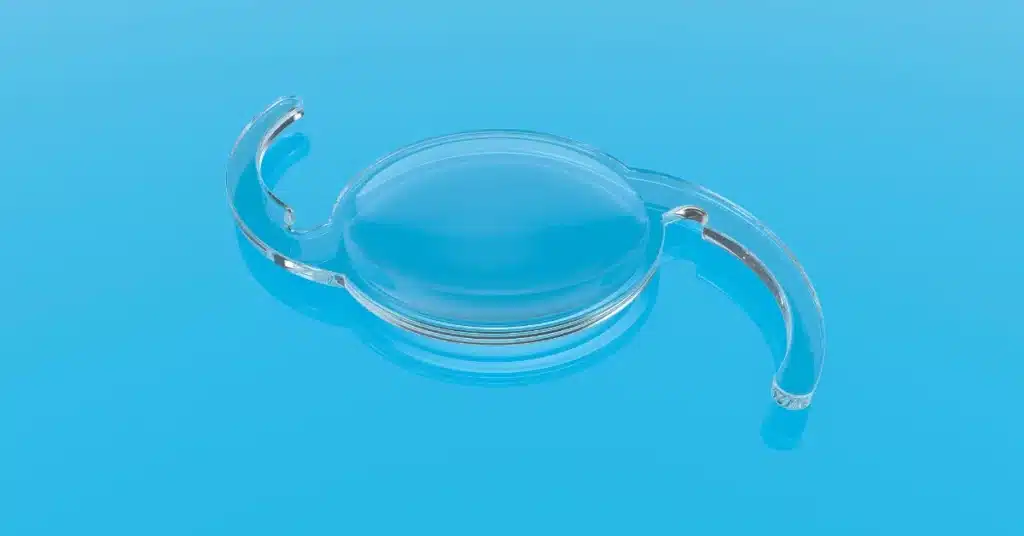A cataract is characterized by cloudy or foggy areas in the eye’s lens, leading to blurred vision and difficulty seeing clearly.
Cataract surgery involves the replacement of the damaged lens with an artificial intraocular lens (IOL).
The choice of cataract surgery lenses varies depending on the type of cataract.
This article will focus on the available types of lenses for cataract surgery and the factors affecting their choice.
Types of lenses for Cataract surgery
The type of lens for Cataract surgery depends on factors such as lifestyle, visual preferences, and doctor’s recommendations.
To enhance vision, various intraocular lenses (IOLs) are utilized in various types of Cataract surgery.
Some of the lenses available for Cataract surgery are multifocal IOLs, monofocal IOLs, and toric IOLs.
Let’s discuss the types of Cataract surgery in detail:
Multifocal IOLs
Multifocal IOLs transformed Cataract surgery by addressing a range of vision needs.
These focal zones are similar to bifocal or trifocal eyeglasses and can reduce a person’s need for glasses.
This function can assist a person in improving their near and distant vision.
However, multifocal IOLs can occasionally induce halos or glare in low-light circumstances.
Monofocal IOLs
 Source: Ogtay_Mammadov_from_GettyImages
Source: Ogtay_Mammadov_from_GettyImagesMonofocal lenses are the most typical option for Cataract surgery.
According to a study, this lens is used during the Extracapsular Cataract Extraction procedure.
Monofocal lenses provide crisp vision at a single focal point and aid with distance vision.
However, users with this lens must wear glasses when using computers or reading.
Accommodating IOLs
The flexible IOLs can move and change their shape within the eye when they are inserted.
The moving and shifting shape lets the user focus on items at different distances.
However, not everyone may see the same benefits from this lens.
Factors such as eye anatomy and health conditions are essential in determining the benefits.
Toric IOLs
Toric lenses are commonly used to treat Astigmatism, a condition where the cornea is irregularly bent.
It can help treat both Cataracts and Astigmatism in a person.
This lens corrects the refractive error in a person’s vision caused by Cataracts, improving their vision.
Key Factors Affecting Cataract Surgery Lens Choices
Various factors, such as patient health, can influence the outcome of Cataract surgery.
The cornea’s health and shape also determine the type of lens that functions well.
A person with Glaucoma or retinal difficulties should use a specialized lens.
Post-operative care and overall eye health also play an important role in recovery.
It is essential to consult an eye care specialist for tailored advice based on your specific condition.
Summing up
A Cataract can be described as the formation of cloudy or foggy patches in the eye’s lens.
Multifocal, Monofocal, Accommodating, and Toric IOLs are some types of Cataract surgery.
While some of these lenses help in close and distant vision, others may just help with concentrating on a certain line of vision.
The choice of lenses may be determined by an individual’s eye condition, doctor’s suggestion and everyday lifestyle.
You should consult an eye specialist if you are seeking the best lens for your Cataract surgery.
Frequently Asked Questions
Which type of lens is best for Cataract surgery?
There is no ‘best’ lens for Cataract surgery. The individual’s specific demands determine the most appropriate type.
Some individuals may solely focus on distant visions, while others may focus on local and distant ones.
What is the newest lens for Cataract surgery?
The Light-Adjustable Intraocular Lens (LAL) is the most recently developed lens for Cataract surgery.
It helps with post-surgical modifications to restore vision and employs a unique light treatment. Also, its ability to provide customized vision correction distinguishes it from others.
Which lens is best for Cataract surgery: monofocal or multifocal?
The choice between monofocal and multifocal lenses depends on individual preferences and visual needs.
Monofocal lenses provide clear vision at a specific distance. In contrast, multifocal lenses offer a broader range, reducing the need for glasses.
Consult with your surgeon to determine the best option for you.
What are the disadvantages of monofocal lenses?
Monofocal lenses allow clear vision across a single distance. However, glasses may be required for close-up work such as reading.
They do not help with many focal points, leading to a reliance on spectacles.
What are the disadvantages of multifocal lenses?
A person wearing a multifocal lens may experience glares or halos in low-light conditions. Some individuals can have a difficult time adjusting to these vision changes.
When referencing outside resources, GoodrxMedicine always provides full citations. To learn more about the measures we use to maintain the quality of our content, please review our Content Information Policy.











